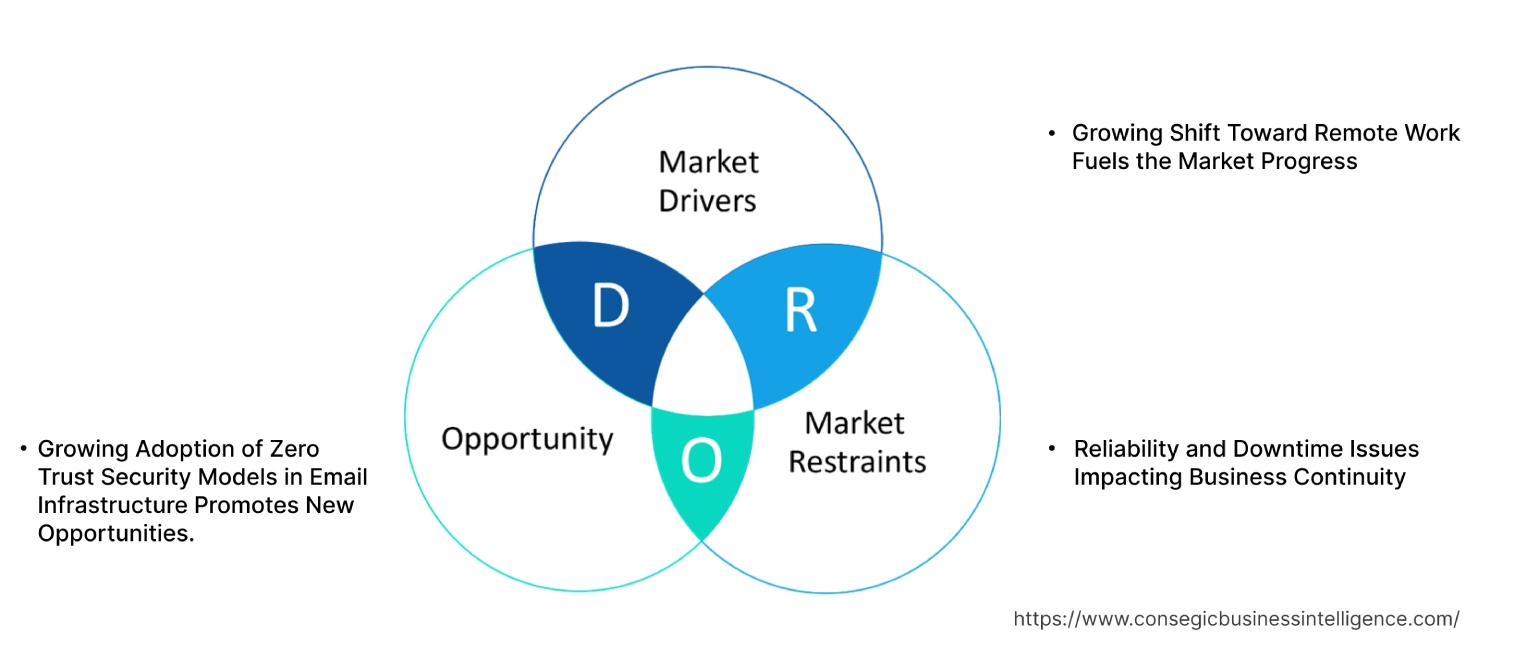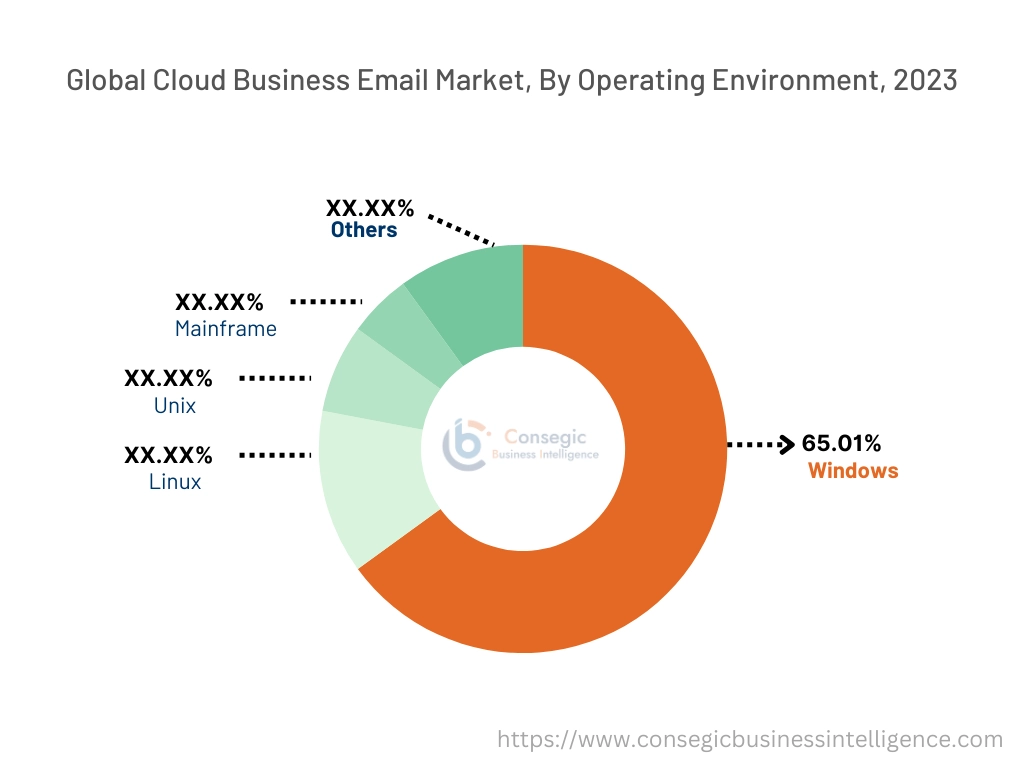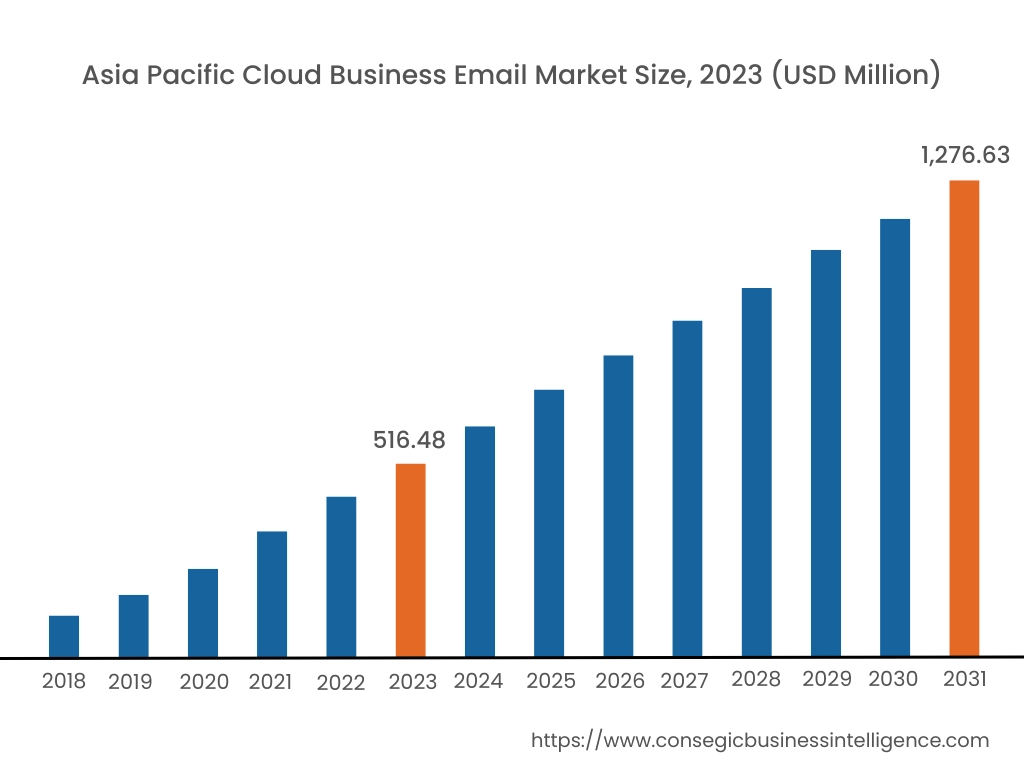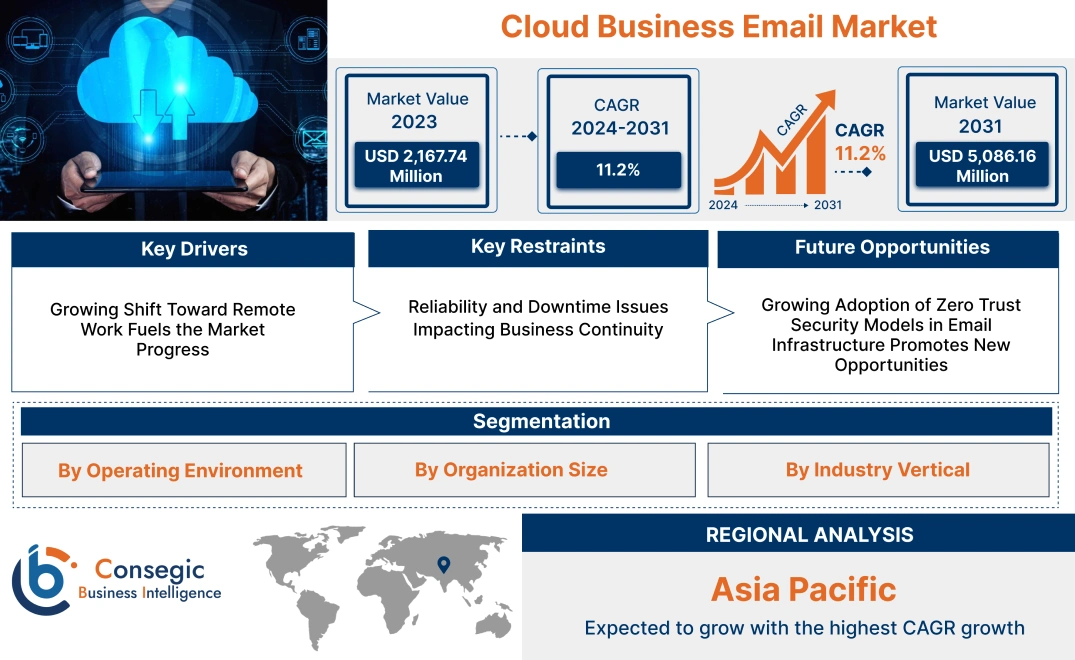- Summary
- Table Of Content
- Methodology
Cloud Business Email Market Size:
Cloud Business Email Market size is estimated to reach over USD 5,086.16 Million by 2031 from a value of USD 2,167.74 Million in 2023 and is projected to grow by USD 2,391.22 Million in 2024, growing at a CAGR of 11.2% from 2024 to 2031.
Cloud Business Email Market Scope & Overview:
The cloud business email market focuses on providing email solutions hosted on cloud infrastructure, enabling organizations to manage their email communications efficiently without relying on on-premises servers. These solutions offer features such as secure email hosting, spam filtering, data backup, and enhanced storage capacity, making them suitable for businesses of all sizes. By leveraging cloud-hosted email services, companies ensure reliable communication, better security, and ease of access from any device or location. The adoption of cloud-based email services is widespread across industries including finance, healthcare, retail, and information technology, where secure and efficient email communication is vital. Cloud business email solutions provide advanced security measures like encryption, multi-factor authentication, and real-time monitoring, ensuring the protection of sensitive business information. Additionally, these services integrate seamlessly with productivity tools and collaboration platforms, enhancing overall business efficiency. Key end-users of cloud email solutions include small and medium-sized enterprises (SMEs), large corporations, and public sector organizations. The market continues to evolve, offering tailored features to meet the specific needs of different business environments, emphasizing reliability, scalability, and enhanced security.
Cloud Business Email Market Dynamics - (DRO) :

Key Drivers:
Growing Shift Toward Remote Work Fuels the Market Progress
The shift towards remote and hybrid work models has been one of the most significant changes in the business landscape in recent years, driven largely by the COVID-19 pandemic. This transition has fundamentally altered how companies operate, making flexible work arrangements a permanent part of many organizations' strategies. Remote work has increased the need for reliable, cloud-based communication tools that enable employees to stay connected, collaborate effectively, and maintain productivity from any location. Cloud-based email services have become a cornerstone of remote work, offering seamless access to email and communication features from any device with an internet connection. The trend towards remote work is particularly strong in industries like technology, professional services, and finance, where knowledge workers perform their tasks efficiently without being tied to a physical office. As remote work becomes more entrenched, businesses are prioritizing investments in cloud communication solutions to support distributed teams, streamline workflows, and ensure secure access to critical business communications further driving the cloud business email market growth.
Key Restraints :
Reliability and Downtime Issues Impacting Business Continuity
The reliability of cloud email services and the potential for downtime are critical concerns for organizations relying heavily on email for daily operations. While cloud providers often guarantee high availability through service-level agreements (SLAs), unexpected outages or service disruptions still occur, affecting business continuity and productivity. For companies in sectors like financial services, healthcare, and e-commerce, even brief periods of email downtime lead to significant operational disruptions, missed communications, and potential financial losses. The dependency on internet connectivity for accessing cloud email services further exacerbates this issue, particularly in regions with unstable or limited internet infrastructure. The risk of downtime and service interruptions may cause hesitation among businesses, especially those requiring uninterrupted access to email for mission-critical activities. Therefore, the risk of downtime and service interruptions poses a significant constraint for businesses, hampering the cloud business email market demand.
Future Opportunities :
Growing Adoption of Zero Trust Security Models in Email Infrastructure Promotes New Opportunities.
The shift towards Zero Trust Security frameworks is creating a new avenue for the development of cloud email solutions. Traditional perimeter-based security models are becoming less effective due to the increasing sophistication of cyber threats and the widespread adoption of remote work. As a result, businesses are adopting Zero Trust principles, which assume that all network traffic is potentially malicious and requires strict identity verification and continuous monitoring. Cloud-based email platforms are well-suited to integrate with Zero Trust architectures, offering features such as multi-factor authentication (MFA), role-based access control, and real-time threat detection. The focus on implementing Zero Trust models to enhance email security aligns with the rising need for advanced protection against phishing attacks, account takeovers, and business email compromise (BEC), driving demand for secure cloud-based email solutions. In conclusion, the adoption of Zero Trust Security frameworks is significantly influencing the cloud business email market opportunities.
Cloud Business Email Market Segmental Analysis :
By Operating Environment:
Based on the operating environment, the market is segmented into Windows, Linux, Unix, Mainframe, and Others.
The Windows environment accounted for the largest revenue of 65.01% of the total cloud business email market share in 2023.
- Windows-based environments are widely preferred due to their user-friendly interface and extensive compatibility with popular email solutions like Microsoft Outlook and Exchange Online.
- Enterprises using Microsoft’s ecosystem benefit from seamless integration with other Microsoft services, including Office 365 and Azure, enhancing productivity and collaboration.
- The dominance of Windows in enterprise environments, especially among companies with large workforces, contributes significantly to the widespread adoption of cloud-based email solutions on this platform.
- The extensive support for third-party applications and strong security features are key factors driving the preference for Windows-based deployments.
- The Windows environment segment leads the market due to its broad adoption, compatibility, and ease of integration with existing enterprise software, which further encourages the cloud business email market growth.
The Linux environment is expected to register the fastest CAGR during the forecast period.
- Linux is gaining popularity for its robust security features, cost-effectiveness, and open-source nature, making it a preferred choice for companies focusing on reducing operational costs.
- Many cloud email service providers offer dedicated solutions for Linux environments, catering to organizations seeking enhanced control and flexibility in managing their infrastructure.
- The increasing adoption of Linux by tech-savvy enterprises, particularly in the IT and telecom sectors, is contributing to the rapid progress of this segment.
- Linux-based systems provide strong customization capabilities and greater control over email server configurations, appealing to organizations with specific IT requirements.
- The Linux environment segment is expected to grow rapidly, driven by its scalability, security, and support for diverse cloud services further fueling the cloud business email market expansion.

By Organization Size:
Based on organization size, the market is segmented into small & medium enterprises (SMEs) and large enterprises.
The large enterprises segment accounted for the largest market share in 2023.
- Large enterprises typically have complex email requirements, including high-volume communication, extensive file sharing, and advanced security needs.
- Cloud email solutions help these organizations streamline communication, enhance collaboration, and ensure compliance with data protection regulations.
- Large enterprises benefit from features such as automated email archiving, advanced spam filtering, and integrated collaboration tools, which enhance efficiency and data management.
- The focus on digital transformation and the increasing use of cloud services for unified communication contribute to the strong adoption of cloud-based email by large enterprises.
- As per cloud business email market analysis, the dominance of the large enterprises segment is due to significant investments in digital infrastructure and the need for scalable, secure email solutions.
The SME segment is expected to register the fastest CAGR during the forecast period.
- Small & medium enterprises are increasingly adopting cloud email solutions to enhance operational efficiency, reduce IT costs, and improve communication capabilities.
- Cloud-based email provides SMEs with a cost-effective, scalable solution that offers robust security features without the need for extensive on-premise infrastructure.
- The flexibility and ease of deployment of cloud email solutions are particularly appealing to SMEs looking to support remote work and improve business continuity.
- The increasing focus on digital adoption and the need for reliable communication tools are driving the growth of cloud email solutions among SMEs.
- As per cloud business email market trends, the SME segment is projected to grow rapidly, supported by the rising adoption of affordable cloud services tailored to the needs of smaller businesses.
By Industry Vertical:
Based on industry vertical, the market is segmented into IT & telecom, BFSI, healthcare, retail & e-commerce, and government & public sector.
The IT & telecom segment accounted for the largest revenue of the total cloud business email market share in 2023.
- The IT & telecom sector is a major user of cloud-based email services, leveraging them for seamless communication, efficient project management, and enhanced client interactions.
- Cloud email solutions help telecom companies handle large volumes of customer communication and ensure secure data transmission across multiple locations.
- The increasing adoption of digital services and the rapid shift towards cloud-based platforms in the telecom sector drive the demand for secure, scalable email solutions.
- The dominance of the IT & telecom segment is due to its early adoption of cloud technologies and the high volume of communication needs within the industry, driving the cloud business email market demand.
The BFSI segment is expected to register the fastest CAGR during the forecast period.
- The banking, financial services, and insurance (BFSI) sector relies heavily on secure, reliable email solutions for client communication, transaction notifications, and compliance reporting.
- Cloud-based email provides enhanced security features like two-factor authentication and end-to-end encryption, helping financial institutions protect sensitive customer information.
- The increasing digitization of financial services and the need for real-time communication are driving the adoption of cloud email in the BFSI sector.
- The strong focus on cybersecurity and data protection in financial services contributes to the steady growth of this segment.
- The BFSI segment is positioned for consistent expansion, supported by the sector's ongoing investment in secure, cloud-based communication infrastructure leading to new cloud business email market opportunities.
Regional Analysis:
The regions covered are North America, Europe, Asia Pacific, the Middle East and Africa, and Latin America.

Asia Pacific region was valued at USD 516.48 Million in 2023. Moreover, it is projected to grow by USD 572.27 Million in 2024 and reach over USD 1,276.63 Million by 2031. Out of these, China accounted for the largest share of 34.1% in 2023. Asia-Pacific is witnessing the fastest growth in the market, with increasing demand from China, India, and Japan. Rapid digitalization, a growing number of small and medium-sized enterprises (SMEs), and expanding IT services drive the need for scalable and cost-effective cloud email solutions. China's emphasis on cloud computing and India's focus on digital business transformation are key growth drivers in the region. Japan's corporate sector, known for its tech-savvy nature, is increasingly adopting cloud-based email platforms for enhanced productivity. In conclusion, the cloud business email market expansion in the Asia-Pacific region is being fueled by digitalization, the rise of SMEs, and significant IT services growth.

North America is estimated to reach over USD 1,948.00 Million by 2031 from a value of USD 822.69 Million in 2023 and is projected to grow by USD 908.2 Million in 2024. North America leads the market, driven by a strong adoption of cloud-based services and digital transformation across key industries like finance, healthcare, and IT. The U.S. dominates the region, with major players like Microsoft (Outlook 365) and Google (Gmail for Business) playing a significant role in the widespread adoption of cloud-based email solutions. Therefore, as per cloud business email market analysis, increasing emphasis on secure communication and compliance with data privacy regulations such as HIPAA and CCPA further accelerates market progress.
Europe is a significant market for cloud business email, supported by robust adoption across sectors including banking, manufacturing, and professional services. The region's focus on compliance with stringent data protection regulations, particularly the General Data Protection Regulation (GDPR), has pushed organizations to adopt secure, cloud-based email platforms. Countries like Germany, the UK, and France are at the forefront, leveraging advanced email solutions for secure corporate communication and data management.
The Middle East & Africa (MEA) region shows increasing potential in the market, led by initiatives in the UAE, Saudi Arabia, and South Africa. The adoption of cloud solutions is being driven by a surge in digital transformation projects, particularly in the financial services, telecommunications, and education sectors. Saudi Arabia's Vision 2030 and the UAE's smart government initiatives have significantly contributed to the growing use of cloud-based email for business operations.
Latin America is an emerging market for cloud business email, with Brazil and Mexico being the primary growth engines. The region's increasing focus on enhancing business communication, combined with a rising trend toward digitalization in sectors such as retail and banking, supports the adoption of cloud-based email solutions. Therefore, as per cloud business email market trends, government efforts to modernize IT infrastructure and improve connectivity are also bolstering the market.
Top Key Players & Market Share Insights:
The Cloud Business Email market is highly competitive with major players providing products and services to the national and international markets. Key players are adopting several strategies in research and development (R&D), product innovation, and end-user launches to hold a strong position in the global Cloud Business Email market. Key players in the Cloud Business Email industry include –
- Google Workspace (USA)
- Microsoft 365 (USA)
- Zoho Mail (India)
- Proton Mail (Switzerland)
- IceWarp (Czech Republic)
- Fastmail (Australia)
- Titan (India)
- com (USA)
- AOL Mail (USA)
- GMX Mail (Germany)
Recent Industry Developments :
Partnerships & Collaborations:
- In September 2024, Cloudflare expanded its partnership with CrowdStrike, integrating Cloudflare Email Security and Zero Trust capabilities with CrowdStrike Falcon Next-Gen SIEM. This collaboration enhances threat visibility and remediation by combining telemetry, customizable workflows, and AI-driven threat intelligence. The integration provides early detection of risks such as phishing and insider threats, enabling organizations to act swiftly. It also allows seamless log sharing between platforms for better analysis and action automation. These advancements aim to improve organizations’ abilities to respond to cyber threats.
Product Enhancements:
- In October 2024, Amazon WorkMail introduced multi-factor authentication (MFA) through AWS IAM Identity Center integration. This feature enhances security by adding an additional layer of authentication for sign-ins, helping reduce unauthorized access risks. It allows administrators to connect to identity providers like Active Directory, Okta, and Microsoft Entra ID. Users can authenticate via IAM credentials for web and email client access, while audit logs track mailbox activities for improved monitoring.
- In September 2024, Trellix introduced advanced Data Loss Prevention (DLP) capabilities within its Email Security Cloud. These features help organizations safeguard sensitive information by identifying and mitigating email-based risks, such as insider exfiltration and accidental sharing. Key functionalities include customizable DLP policies, exact data matching across over 400 file types, and integration with Trellix's enterprise-grade DLP solution. This system streamlines enforcement of data protection and compliance policies while enhancing monitoring and response to email-related incidents.
Cloud Business Email Market Report Insights :
| Report Attributes | Report Details |
| Study Timeline | 2018-2031 |
| Market Size in 2031 | USD 5,086.16 Million |
| CAGR (2024-2031) | 11.2% |
| By Operating Environment |
|
| By Organization Size |
|
| By Industry Vertical |
|
| By Region |
|
| Key Players |
|
| North America | U.S. Canada Mexico |
| Europe | U.K. Germany France Spain Italy Russia Benelux Rest of Europe |
| APAC | China South Korea Japan India Australia ASEAN Rest of Asia-Pacific |
| Middle East and Africa | GCC Turkey South Africa Rest of MEA |
| LATAM | Brazil Argentina Chile Rest of LATAM |
| Report Coverage |
|
Key Questions Answered in the Report
How big is the Cloud Business Email market? +
Cloud Business Email Market size is estimated to reach over USD 5,086.16 Million by 2031 from a value of USD 2,167.74 Million in 2023 and is projected to grow by USD 2,391.22 Million in 2024, growing at a CAGR of 11.2% from 2024 to 2031.
What specific segmentation details are covered in the Cloud Business Email Market report? +
The Cloud Business Email market report includes segmentation details for the operating environment (Windows, Linux, Unix, Mainframe, and others), organization size (small & medium enterprises and large enterprises), industry vertical (IT & telecom, BFSI, healthcare, retail & e-commerce, government & public sector), and region.
Which is the fastest-growing organization size segment in the Cloud Business Email market? +
The SMEs segment is expected to register the fastest CAGR during the forecast period, driven by the rising adoption of affordable, scalable, and secure cloud email solutions tailored for smaller businesses.
Who are the major players in the Cloud Business Email market? +
The major players in the Cloud Business Email market include Google Workspace (USA), Microsoft 365 (USA), Zoho Mail (India), Proton Mail (Switzerland), IceWarp (Czech Republic), Fastmail (Australia), Titan (India), Mail.com (USA), AOL Mail (USA), and GMX Mail (Germany).

